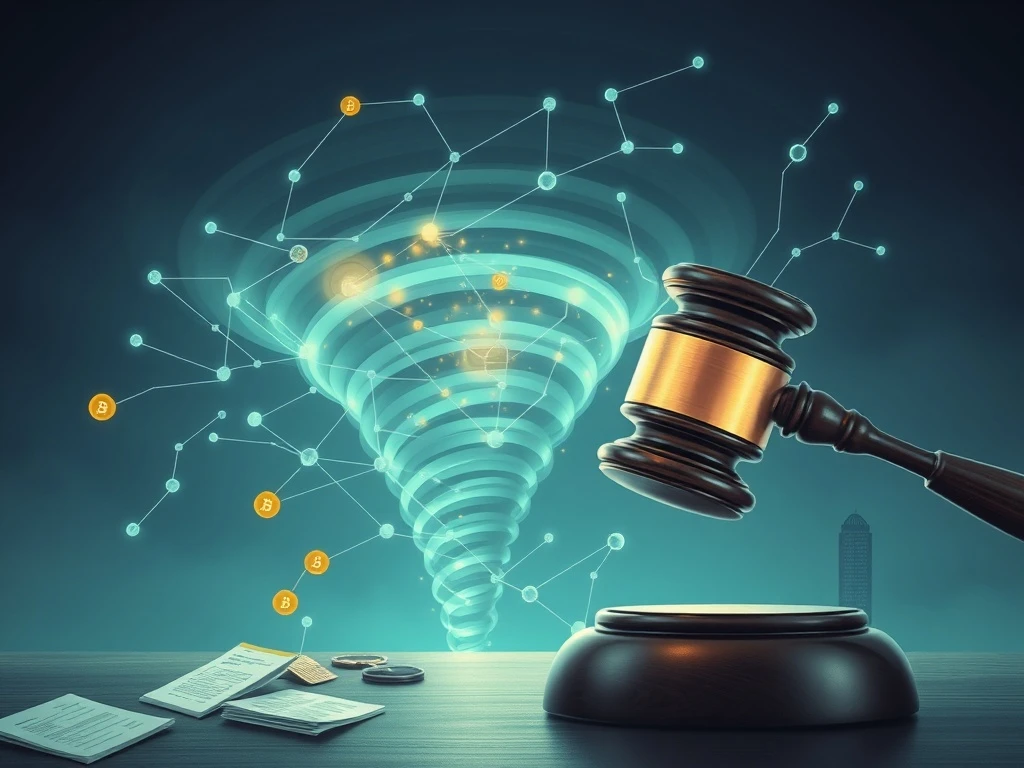Unprecedented Legal Storm: DOJ Targets Dragonfly Capital Over Tornado Cash Investment

The cryptocurrency world is abuzz with an unprecedented legal challenge that could redefine the boundaries of investor responsibility. The U.S. Department of Justice (DOJ) is reportedly weighing legal action against Dragonfly Capital, a prominent crypto venture capital firm, over its 2020 investment in PepperSec, Inc., the developer behind the controversial privacy mixer, Tornado Cash. This move signals a significant escalation in regulatory scrutiny, potentially setting a chilling precedent for venture capitalists funding decentralized finance (DeFi) projects.
Why is Dragonfly Capital in the DOJ’s Crosshairs?
The DOJ’s investigation stems from ongoing probes into Tornado Cash developers, who face allegations of sanctions violations and money laundering. Dragonfly Capital’s investment in PepperSec, Inc., the entity behind Tornado Cash, in 2020 has now brought the venture firm into the regulatory spotlight. This isn’t just about the project itself; it’s about whether the investors who backed it can be held accountable for its alleged misuse.
Key aspects of the DOJ’s focus include:
- 2020 Investment: Dragonfly’s financial backing of PepperSec, Inc., the company that developed Tornado Cash.
- Alleged Misuse: Tornado Cash’s role in facilitating illicit transactions, leading to U.S. sanctions.
- Broader Strategy: The DOJ’s intent to test the limits of venture capitalist liability, even in the absence of direct operational control over the funded project.
Dragonfly’s Managing Partner, Haseeb Qureshi, has publicly defended the investment, emphasizing its goal to support privacy-preserving technology while adhering to FinCEN guidelines. He argues that holding investors liable for portfolio company actions could severely stifle innovation, particularly in the open-source privacy sector.
The Core Debate: Can Investor Liability Reshape DeFi?
The potential charges against Dragonfly Capital and its executives represent a first-of-its-kind legal challenge for crypto venture capital. Prosecutors are reportedly scrutinizing internal communications between Dragonfly and Tornado Cash developers, looking for evidence that Dragonfly’s advisory role extended beyond passive investment. This could be a crucial point of contention.
This case raises critical questions about the boundaries of investor responsibility in the rapidly evolving decentralized finance (DeFi) landscape. Traditionally, venture capitalists are seen as passive investors, not liable for the day-to-day operations or misuse of the products developed by their portfolio companies. However, the DOJ’s approach suggests a redefinition of accountability in the crypto sector.
Legal analysts warn that if the DOJ succeeds, it could have a significant “chilling effect” on venture funding for privacy protocols and other innovative but potentially risky decentralized technologies. This could force venture capital firms to adopt far stricter due diligence and oversight measures for projects with any potential for misuse, potentially slowing the pace of innovation.
Connecting the Dots: Tornado Cash Trial and Ecosystem Accountability
The investigation into Dragonfly Capital runs parallel to the ongoing trial of Tornado Cash co-founders Roman Storm and Roman Semenov, who face severe charges including money laundering. The DOJ’s strategy appears to be one of extending liability across the entire crypto ecosystem, from the developers who build the tools to the financial backers who enable them.
Prosecutors are asserting that advisory relationships and financial support can establish culpability, a claim vigorously disputed by Dragonfly. This broad interpretation of liability could mean that anyone involved in the funding or support of a project deemed illicit could face legal repercussions, potentially reshaping how crypto projects secure funding and operate.
DOJ Crypto Crackdown: What Does it Mean for the Industry?
The DOJ’s actions against Dragonfly Capital are part of a broader trend of tightening regulatory oversight in the crypto space. Previous government actions against privacy protocols have already sparked concerns about the future of open-source innovation. If charges against Dragonfly proceed and are successful, they could further blur the line between legitimate investment and complicity in illicit activity, with ripple effects across the entire sector.
The outcome of this case will be a pivotal moment for the intersection of law and decentralized finance. It will test how traditional liability frameworks can adapt to the complexities of decentralized systems, where control is often distributed and operations are permissionless.
Navigating the Future: The Impact on DeFi Regulation and Innovation
For the broader crypto industry, this case could fundamentally reshape investment practices. A ruling favorable to the DOJ might compel venture firms to implement significantly stricter oversight of their portfolio projects, potentially slowing the pace of innovation in privacy-focused sectors. Conversely, a dismissal of charges could reinforce the principle of investor neutrality, allowing continued support for decentralized technologies without the immediate threat of indirect liability.
Regardless of the outcome, the case underscores the growing need for clarity in DeFi regulation and the importance of robust compliance frameworks for all participants in the crypto ecosystem. The resilience of blockchain infrastructure, as evidenced by Ethereum’s recent market performance (ETH price at $3,718.87, with significant gains in July 2025), suggests the underlying technology remains strong despite these regulatory headwinds. However, the legal battle highlights the increasing pressure on anonymity-enabling projects.
The DOJ’s potential legal action against Dragonfly Capital over its Tornado Cash investment marks a critical juncture for the crypto industry. It challenges long-held notions of investor responsibility and raises profound questions about the future of innovation in decentralized finance. As this unprecedented legal storm unfolds, its resolution will undoubtedly set a significant precedent, shaping how venture capital operates in the crypto space and influencing the trajectory of DeFi regulation for years to come.
Frequently Asked Questions (FAQs)
What is Dragonfly Capital’s alleged involvement with Tornado Cash?
Dragonfly Capital is under scrutiny by the DOJ for its 2020 investment in PepperSec, Inc., the developer of Tornado Cash. The DOJ is investigating whether Dragonfly’s financial backing and advisory role could make it liable for Tornado Cash’s alleged misuse in money laundering and sanctions violations.
What is “investor liability” in the context of this case?
Investor liability, in this context, refers to the potential for venture capital firms or their executives to be held legally responsible for the actions or alleged illicit activities of the projects they fund, even if they don’t have direct operational control. The DOJ is reportedly examining Dragonfly’s communications to argue that their involvement went beyond passive investment.
How could this case impact future crypto investments, especially in DeFi?
If the DOJ succeeds, it could set a precedent that might deter venture funding for privacy protocols and other decentralized technologies perceived as high-risk. This could lead to stricter due diligence requirements for VCs and potentially slow innovation in certain sectors of DeFi, as firms become more cautious about potential legal repercussions.
What is Tornado Cash, and why is it controversial?
Tornado Cash is a cryptocurrency mixer designed to enhance transaction privacy by breaking the on-chain link between source and destination addresses. It became controversial after being used by illicit actors, including sanctioned entities, leading to the U.S. Treasury sanctioning the protocol itself and the arrest of its co-founders for alleged money laundering.
Are there similar cases of investors being targeted for portfolio company actions?
While cases of investors being held liable for direct fraud or clear operational control are known, this case is considered a first-of-its-kind challenge for crypto venture capital. It tests the boundaries of liability for investments in decentralized, open-source projects where direct control is often ambiguous.
What is the significance of the parallel Roman Storm/Semenov trial?
The ongoing trial of Tornado Cash co-founders Roman Storm and Roman Semenov on money laundering charges is significant because the DOJ’s investigation into Dragonfly Capital runs parallel to it. This indicates a broader strategy by prosecutors to extend liability across the entire crypto ecosystem, linking developers, their financial backers, and the tools they create to alleged illicit activities.









